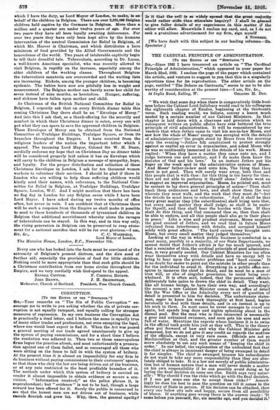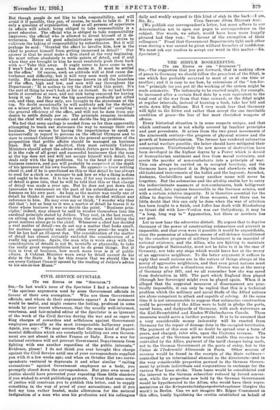TEE CARDINAL PRINCIPLE OF ADMINISTRATION. (To THE EDITOR OE THE
" SPIXTATOR."3 Sie,—Since 1902 I have treasured an article on "The Cardinal Principle of Administration," which appeared in your paper for March 22nd, 1902. I enclose the page of the paper which contained the article, and venture to suggest to you that this is a singularly opportune time for its reproduction. The other article on the page, entitled "The Debate on Contracts," seems to me to be also worthy of consideration at the present time.—I am, Sir, &c.,
"We wish that some day when there is comparatively little busi- ness before the Cabinet Lord Salisbury would read to his colleagues the eighteenth chapter of Exodus, beginning at the thirteenth verse. Such reading would, we believe, convey a lesson much needed by a certain number of our Cabinet Ministers. In that chapter is laid down with a clearness and precision which no subsequent writers on public affairs have ever bettered the true principle of civil administration. It will be remembered by our readers that when Jethro came to visit his son-in-law Moses, and saw how the whole of Moses' energy was occupied with the details of administration—' the people stood by Moses from the morning unto the evening '—Jethro felt constrained to protest strongly against so capital an error in organization, and asked Moses why he was so continually immersed in the details of his work. Moses replied : When they have a matter they come unto me, and I judge between one and another, and I do make them know the statutes of God and his laws.' In an instant Jethro put his finger on the weak spot in the administrative system of Moses.
And Moses' father-in-law said unto him, The thing that thou doest is not good. Thou wilt surely wear away, both thou and this people that is with thee : for this thing is too heavy for thee; thou art not able to perform it thyself alone.' Jethro went on to suggest an improved organization. Moses, he pointed out, must be content to lay down general principles of action= Thou shalt teach them ordinances and laws, and shalt show them the way wherein they must walk, and the work that they must do '—but the details he must leave to subordinates. And it shall be that every great matter they f the subordinates) shall bring unto thee, but every small matter they shall judge; so shall it be easier for thyself, and they shall bear the burden with thee. If thou shalt do this thing, and God command thee so, then thou shalt be able to endure, and all this people shall also go to their place in peace.' Like a wise and prudent statesman, Moses accepted the good counsel of Jethro, and we read that in future Moses refrained from interference with details, and occupied himself solely with great affairs. 'The herd causes they brought unto Moses, but every small matter they judged themselves.'
Looking at the way in which public business is conducted in a great many, possibly in a majority, of our State Departments, we cannot doubt that Jethro's advice is far too much ignored, and that a reminder of this, the cardinal principle of good administra- tion, is very greatly needed. Our Cabinet Ministers far too often wear themselves away with details and have no energy left to bring to bear upon the greater problems and hard causes.' It is no doubt far easier to point out the mistake in other people than for the individual to avoid it. Everything in a public office con- spires to immerse the chief in detail, and he must be a man of iron will, or else of singular prescience, to resist being over- whelmed. It is often said, indeed, that the permanent officials deliberately take pains to drown the chief in detail. They want, like all human beings, to have their own way, and accordingly the moment a new Cabinet Minister comes to an office of detail like the War Office or the Admiralty every sort of question of detail is presented to him for decision. The unfortunate states- man, eager to know his work thoroughly at first hand, begins heroically to deal with these details, and in an instant is up to his neck in them. In most cases he never manages to crawl out grin, but spends long days and nights splashing about in the dismal pool. But the man who is thus immersed is necessarily a poor and untrained swimmer, and soon gets his eyes and ears full of water. Meantime the experts whose business it is to swim in the official tank guide him just as they will. This is the theory often put forward of how and why the Cabinet Minister gets immersed, but we do not give it any credit as regards the motives of the officials, except in very rare cases. Officials are not so Machiavellian as that, and the greater number of them would scorn absolutely to use any such means of keeping the chief in order.' In our belief, the explanation of the undoubted fact that the chief is always in imminent danger of being swamped in detail is far simpler. The chief is swamped because his subordinates do not want to take any more responsibility than they are abso- lutely obliged to take. It is a law not merely of public administra- tion but of human nature that a man will never decide a matter on his own responsibility if he can possibly avoid doing so by laying the final decision on some one else. Smith says very natur- ally: ' Why should I run the risks which go with the final decision, if I can get some one else to accept those risks?' Accord- ingly ho does his best to pass the question on till it comes to the Secretary of State in person. If his decision can be obtaihed, then every one below sits safe and happy, secure from all possibility of blame. If anything goes wrong there is the answer ready : 'It came before you yourself, Sir, six months ago, and you decided it...
But though people do not like to take responsibility, and will avoid it if possible, they can, of course, be made to take it. It is only a question of organisation. And as all persons of experience in affairs will admit, being obliged to take responsibility is a great educator. The official who is obliged to take responsibility improves; the official who is allowed to divest himself of it de- teriorates. Hence all good administrative organizers strive to cultivate the taking of responsibility by subordinates. But it will perhaps be said: 'Granted the effort to involve him, how is the chief to protect himself from getting immersed in detail? ' Our answer is that he must make a firm stand at the very beginning. He must refuse absolutely to settle points of detail, and if and when they are brought to him he must resolutely push them back with a—` Take this away. It ought never to have come to me. I won't look at it even, much less decide it. It must be settled in the office.' Of course, such an attitude will at first cause dis- turbance and difficulty, but it will very soon work out satisfae- torily. His determination will become known in all the branches of the office, high and low, and men will say throughout the Department : 'It is useless to try the chief with this point. It's the sort of thing he won't look at for an instant. So we had better settle it ourselves at once, and not risk being censured for having hung it up.' In this way the big questions gradually get sifted out, and they, and they only, are brought to the statesman at the top. No doubt occasionally he will suddenly ask for the details on a minor point, but this will be merely a method of ' sampling ' the general efficiency of the office, and will not be done from any desire to settle details per se. The principle remains inviolate that the chief will only consider and decide the big problems.
We feel that some apology is needed from us for thus apparently attempting to teach our statesmen the way to manage their own business. Our excuse for having the impertinence to speak so unreservedly in regard to persons on the official Olympus and to dare to counsel Cabinet Ministers is the general acceptance of the proposition that public affairs should be managed on business lines. But if this is admitted, then most certainly Cabinet Ministers should adopt the advice which Jethro gave to Moses, for it is the rule of all great and successful businesses that the man at the top does not and will not occupy himself with detail, but deals only with the big problems. Go to the head of some groat business concern, and you will probably be surprised at the depth of his ignorance of his own business. He appears to know nothing about it, and if he is questioned on this or that detail he has always to send for a clerk or a manager to ask how or why a thing is done and ought to be done. It is ten to one, if for any reason a matter of detail is gone into, that he will be told that this or that change of detail was made a year ago. But he does not put down this ignorance to remissness on the part of his subordinates or care- lessness on his own part. As long as the matter was really one of detail he thinks it most natural that it was decided without any reference to him. He may even say or think, 'I wonder why they did that'; but as long as it was a matter of detail he leaves it to those whose business it was to decide the point. 'Business prin- ciples,' indeed, may almost be said to resolve themselves into the cardinal principle stated by Jethro. They rest, in the last resort, on sifting out the great matters from the small, and letting the great matters alone go to the chief. Whenever a chief has decided a real matter of detail—we do not say a matter that looks small, for matters apparently small are often very great—he ought to feel he has had an ill-spent day. The consideration of the matter of detail has almost certainly excluded the consideration of a really big question. Again, the man who is worn away with the consideration of details is not fit, mentally or physically, to take the really great responsibilities and to do great things. But if this is true of business, how much more true is it of public affairs. A Cabinet Minister worn away by detail cannot do his duty to the State. It is for this reason that we should like to see every Cabinet Council opened by the reading of Jethro's advice to his son-in-law Moses."



































 Previous page
Previous page